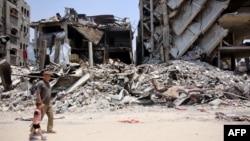
The fate of a proposal to temporarily halt fighting in Gaza, increase humanitarian aid and set free some hostages held by Hamas remained uncertain Tuesday, with Hamas yet to respond to the proposal, Israeli officials questioning some of the details and the United States seeking U.N. Security Council support for the deal’s acceptance and implementation.
A draft U.S. resolution seen by VOA calls on Hamas to fully accept and implement the cease-fire proposal “without delay and without condition.”
The draft says, “swift implementation of this deal would enable a ceasefire, withdrawal of Israeli forces from populated areas in Gaza, the release of hostages, a surge in humanitarian assistance, restoration of basic services, and the return of Palestinian civilians to northern Gaza.”
U.S. State Department spokesperson Matthew Miller told reporters Monday that Hamas, which received the cease-fire proposal Thursday, had yet to respond. He said the major elements of the proposal “are nearly identical to the major elements of the proposal that Hamas submitted several weeks ago.”
The basic outline of the deal includes a six-week halt in fighting, the release of some hostages from Gaza, daily deliveries of 600 trucks of aid for Palestinians and further negotiations aimed at securing a permanent end to the conflict.
U.S. officials reiterated Monday that the cease-fire proposal, though presented publicly by U.S. President Joe Biden last week, is an Israeli proposal.
A Palestinian child pulls water containers, amid the ongoing conflict between Israel and Hamas, in southern Gaza City, June 3, 2024.
White House national security spokesman John Kirby told reporters that making public negotiations that officials have declined to reveal in the past for fear of disrupting the negotiation process was not about putting pressure on Israeli officials, but rather, if anything, publicly pressuring Hamas and its leaders to accept the deal.
“The president felt that where we are in this war, where we are in the negotiations to get the hostages out, that it was time for a different approach and a time to make the proposal public, to try to energize the process here, catalyze a different outcome,” Kirby said.
Kirby said in earlier comments to reporters that if Hamas were to accept the proposal, Israel would as well.
Israeli Prime Minister Benjamin Netanyahu told a parliament committee Monday that “claims that we have agreed to a ceasefire without our conditions being met are incorrect,” according to a statement from his office.
An Israeli government spokesperson said ‘the war will be stopped for the purpose of returning the hostages’ after which discussions would follow on how to achieve Israel’s goal of eliminating Hamas
Leaders of the Group of Seven leading industrial nations issued a joint statement Monday fully endorsing the cease-fire proposal.
“We call on Hamas to accept this deal, that Israel is ready to move forward with, and we urge countries with influence over Hamas to help ensure that it does so,” the statement said.
The foreign ministers of Egypt, Jordan, Saudi Arabia, Qatar and the United Arab Emirates said after a virtual meeting Monday that they support efforts to negotiate a permanent cease-fire, while also emphasizing “dealing seriously and positively” with the proposal outlined by Biden.
The ministers called for Israel’s full withdrawal from the Gaza Strip, the return of displaced Palestinians to areas they fled, the launch of reconstruction efforts in Gaza, and the implementation of a two-state solution, according to a statement release by Jordan’s foreign ministry.
 A Palestinian man holds the hand of a little boy as they walk past the rubble of destroyed buildings in the Jabalia refugee camp, in the northern Gaza Strip on June 3, 2024.
A Palestinian man holds the hand of a little boy as they walk past the rubble of destroyed buildings in the Jabalia refugee camp, in the northern Gaza Strip on June 3, 2024.
Humanitarian challenges
U.N. humanitarian officials say the fighting in Gaza, particularly in northern and southern Gaza, is making it increasingly difficult to deliver badly needed assistance to the Palestinians.
The U.N. Office for the Coordination of Humanitarian Affairs said in its latest update Monday that the situation in Rafah is particularly difficult, with World Food Program workers only able to reach 27,000 people with hot meals and humanitarian workers unable to provide services amid intensified hostilities and evacuation orders.
The agency said the fighting in Rafah has forced the displacement of about one million people. Many of those who were in Rafah had gone there after fleeing other parts of Gaza in search of safety.
Hamas launched a terror attack Oct. 7 on Israel, killing about 1,200 people according to Israeli tallies and taking roughly 250 hostages. About 120 of the hostages remain in Gaza, including 37 the Israeli military says are dead.
Israel’s retaliatory bombardments and ground offensive have killed at least 36,400 people in Gaza, mostly civilians, according to the Gaza Health Ministry. The death toll includes both civilians and combatants.
Some information for this report was provided by The Associated Press, Reuters and Agence France-Presse.
-


VOA News
The Voice of America provides news and information in more than 40 languages to an estimated weekly audience of over 326 million people. Stories with the VOA News byline are the work of multiple VOA journalists and may contain information from wire service reports.


